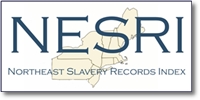
Scarlett Hoey
The Massachusetts Slave Census (1754)
digital inkjet print, 11″ x 14”, 2022
Harvard & the Legacy of Slavery: Reparative Partnership Grant Program and the Northeast Slavery Records Index (NESRI) share the goals of understanding the extent and nature of historical enslavement and its ongoing impacts on descendant communities. In support of Harvard’s program, NESRI had added online resources to aid those responding to the current Request for Proposals and, in the future, for those projects funded through the program.
The Harvard program emphasizes support for innovative and achievable ideas that address systemic inequities affecting contemporary descendant communities, particularly in Boston and Cambridge. NESRI’s focus is on documenting the details of enslavement in specific locales, including Boston and Cambridge, which supports initiatives such as those that Harvard aims to fund.
Understanding the contemporary consequences of historical slavery in a community is enhanced by the fullest understanding of the actual historical slavery in the communities involved. NESRI is highlighting some free, publicly available, online resources that can inform the development of responses to the Request for Proposals and the implementation of projects that are ultimately funded.
In the sidebar adjacent to this article are links to NESRI reports of slavery records in Suffolk County and Boston, and Middlesex County and Cambridge. We include links to the counties of Boston and Cambridge because many life events of the people enslaved in Boston and Cambridge took place in surrounding areas. Documenting these life events frequently involves records in adjacent localities.
Note that NESRI is an online searchable compilation of records that identify individual enslaved persons and enslavers in the states of New York, Maine, New Hampshire, Vermont, Massachusetts, Rhode Island, Connecticut, New Jersey and Pennsylvania. NESRI is engaged in an ongoing research process to locate and index records, and our collection, while extensive, is always being expanded. Because the reports are generated online at the moment requested, reports always reflect the latest additions to the database.
We also provide a link to our NESRI Report of Harvard’s Legacy of Slavery. This report is part of a collection titled Slavery and Colleges, Universities and Schools, which starts with the northeast colleges and universities founded in the colonial period, before the United States was established. Our strategic view is that when campus officials modeled and normalized slavery, this impacted their students, who as alumni brought these values and norms back home. Thus, slavery on campus would have promoted slavery in distant locations. This would have been particularly true when the campuses were educating future ministers and religious leaders who would go on to model and espouse slavery in their congregations and home communities.



